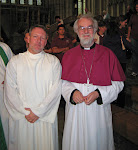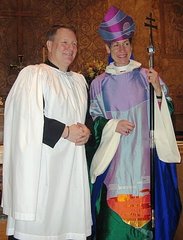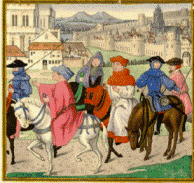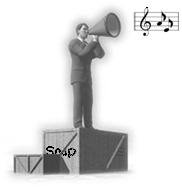Preached on the Feast of Pentecost, Sunday, May 27, 2007 at St. James Episcopal Church Fordham Manor: http://www.stjamesf.dioceseny.org/. Scripture readings this sermon is based on can be found at by clicking here.
My grandmother was a fairly typical farm wife. She cooked and cleaned. She planted a garden that was as much as an acre or more, and in that garden she grew all the vegetables that the family would eat through the summer, as well as enough to ‘put up’ as we say, for the winter. She kept chickens and a milk cow. The chickens provided eggs, and once in a while, a fried chicken dinner on Sunday. The milk cow provided milk, and with a little churning, butter. She kept enough chickens and the output of the cow was such that there were eggs and butter left over after the household needs were met. My grandmother ran a small retail business selling these excess eggs and butter to the folks in Bruce, MS, the town a few miles from the farm.
I was always fascinated by the chickens and how my grandmother tended to them. She would feed them each day by scattering corn on the ground from an old pail. And as she did so, the hens and the baby chicks would all crowd around her feet, forming a kind of teeming sea of birds. They would follow her everywhere, and dog her every step. I was amazed at the way they would manage to scoot out of the way of her feet just in time, to avoid getting stepped on. As my grandmother aged, I worried that she might trip over the chickens as her steps became more feeble. But such a mishap never occurred. They understood each other, my grandmother and her chickens. They knew to gather about her as she scattered corn on the ground for them to eat, and to rush from under her tread. She could move so skillfully among them, gathering the eggs they had laid for tomorrow’s breakfast, and for the egg and butter customers in town.
In our reading today from Acts, Jews from across Judea and beyond are gathered in Jerusalem. The feast of Pentecost is at hand. In Greek ‘Pentecost’ means 50th day and it is the fiftieth day after Passover. In Hebrew, the holiday is called Shavuot, which means ‘weeks’ and it is the culmination of the Feast of Weeks celebrating the harvest. It is one of the pilgrimage holidays, when Jews were required to travel to Jerusalem to make an offering at the Temple. It came at the conclusion of the barley harvest and the beginning of the wheat harvest. The first fruits of the harvest -- two loaves of breach -- were brought to the Temple in Jerusalem and offered up as a thank offering and a sacrifice to God.
This teeming crowd is drawn together at the house where the apostles are staying, by the sound of a violent wind, then to hear the disciples speaking to them in their own languages. The crowd is astonished; they know that the apostles are all from Galilee, a rural backwater some miles from Jerusalem. How could these country folk be so accomplished in languages not their own? The travelers from around the world are brought together by the sound of the wind of the Spirit, and then they are united in the Gospel of Jesus Christ, preached to them in their own tongues by a band of, of all things, Galileans.
Some have wondered if the Pentecost was a miracle of speaking or of hearing. The sound of the wind brought the crowd to the apostles door, so hearing is a big part of the story. But did the crowd, by some miracle, suddenly understand Aramaic, the common everyday language of Galilee? Or did the apostles truly speak in a dozen or more different languages? Or was this an instance of glossilalia, of “speaking in tongues”, a kind of babbling or gibberish that was miraculously understood by the crowd? Well the Greek in Acts 2:6 is “dialecto” or dialect, and that means a specific language, a particular dialect spoken in a particular place. The phenomenon being described by Luke in chapter 2 of Acts is one in which these 12 Galileans were able to speak in the many individual languages of the crowd gathered in Jerusalem for the Feast of Shavuot.
It sounds like a miracle and it was. But there were doubters from the get go. One of the crowd pipes up and says, “Maybe they’re all drunk.” Hmmm, that makes it sound more like babbling and less like an ancient equivalent of a Berlitz School of International Languages, doesn’t it? But Peter answers the heckler back, and says no, they’re not drunk, its only 9 o’clock in the morning after all! And he begins to preach the Gospel of Jesus Christ, -- once dead, now risen and ascended.
In some Christian Churches today, they are reading the account of the Tower of Babel from Genesis. In that famous story, God scatters the peoples of the earth and confuses their attempts to build their vain tower up to the very heavens. God makes it so the tower-builders can no longer speak the same language so they cannot complete their task and they are scattered throughout the earth. It is many, many thousands of years later by the time we get to the account of the Pentecost in Acts. Abraham and Moses, and Deborah, David and Joshua, have all come and gone; and still Israel waits for the messiah.
In the midst of this expectation, Peter preaches a radical message in the verses that immediately follow today’s reading from Acts. This Jesus Christ who has been crucified has been raised up and exalted at the right hand of God. This Galilean has been made God’s messiah. There is only one response that can be made to such a radical, reality-altering event: “Repent and be baptized,” says Peter; “and you will receive the gift of the Holy Spirit. For the promise is for you, for your children, and for all who are far away, everyone whom the Lord our God calls..."
The promise is for everyone, near and far. That’s why the apostles speak in dozens of foreign languages and obscure dialects. It is evidence of exactly what Peter preaches to the crowd -- that the gift of the Spirit and the salvation of Jesus Christ is for all the world. From this point on in Acts and throughout the rest of the New Testament, that story will be told. Paul and Titus and Timothy, and Augustine of Canterbury and Patrick of Ireland, and hundreds of other believers will spread the gospel throughout the world. It will make its way to Thessalonica and to Corinth and to Rome, it will make its way to England and Ireland, it will make its way to Nigeria, Jamaica, St. Kitts and Belize. It will make its way to the farms around Bruce, Mississippi where my grandmother will testify to the same gospel that Peter preached in the hymns she sang while she churned butter and packed eggs for her customers in town.
In our reading from the Gospel of John, Jesus promises the apostles ‘another Advocate’ to come and abide with them and be in them. That word ‘advocate’ sounds a bit legal, doesn’t it? Lawyers are called ‘advocates’ in Britain and some former British colonies. The Greek word here is ‘paraclete’ and it has a legal connotation as well. In some ancient court systems, the paraclete was not a lawyer, but was a trusted friend who would accompany you to court and speak on your behalf. You would make your case before the court, and then the paraclete was testify to the strength of your moral character and would thereby strengthen your case before the court. Jesus promises the disciples a trusted friend who will abide with and in them and will help strengthen them for the work he has given them to do. This advocate will provide them with the power to heal, the power to preach, and the authority to forgive sins.
And as we see in our reading from Corinthians, this advocate, this Spirit of truth has a unifying effect. It has been passed to the apostles and then, as Peter says, to each of us in Baptism. It brings us together as one, even while providing us with different strengths, different gifts with which to proclaim the gospel. It doesn’t matter who we are, where we come from, or how it is we serve God -- whether as parents or priests, whether we are healers of the sick or teachers of English as a second language; we serve God in our work and in our lives, and we are one in the Spirit. The story of the Tower of Babel has been reversed. Those who for their vanity have been scattered to the corners of the earth, are now gathered by the Spirit and made one by the salvation of Jesus Christ.
Acts chapter 2 says that 3,000 believers were added to that small circle of Galileans on Pentecost, and for that reason we account this feast day as the birthday of the Church. As Jesus had promised, 10 days after his ascension the expected Advocate has come. The Spirit has descended on the apostles, and enabled this small band of rural Galileans, fishermen and carpenters many of them, to preach Christ crucified and risen again with such power and conviction that the gospel has never died -- it is the same gospel that has come down to us here today. We are gathered together in this church this morning just like the apostles in that upper room on Pentecost. In a few moments we will call upon God’s Spirit to bless and sanctify the bread and wine that we will offer, and our very selves. We will eat of the body of Christ and we will drink of the one Spirit, like generations of Christians before us. Though we are many people from many places with many different gifts, we are one in the one Spirit.
In the Gospel of Luke, Jesus says, “I desired to gather your children together as a hen gathers her brood under her wings.” And so it has come to be. Like my grandmother’s chickens, we gather together to be fed with the food of eternal life. We trust in our savior to feed us and sustain us. We remain forever in God’s Holy Spirit come down to us and the Spirit remains in us, abiding with us, constantly at our side, brooding over the earth like a mother over her children. ~~ AMEN.
27 May 2007
Sermon for Year C, Pentecost: "Gathering The Scattered"
Subscribe to:
Post Comments (Atom)







No comments:
Post a Comment